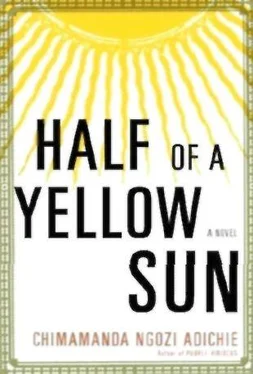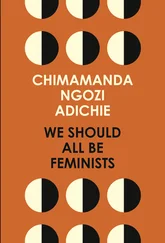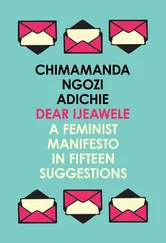Another flight arrival was announced and the father said, "Chere! It's him? It's him!"
The children stood up and the father asked them to sit down and then stood up himself. The grandmother clutched her handbag to her belly. Olanna watched the plane descend. It touched down, and just as it began to taxi on the tarmac, the grandmother screamed and dropped her handbag.
Olanna was startled. "What is it? What is it?"
"Mama!" the father said.
'Why does it not stop?" The grandmother asked, both hands placed on her head in despair. "Chi ml My God! I am in trouble! Where is it taking my son now? Have you people deceived me?"
"Mama, it will stop," Olanna said. "This is what it does when it lands." She picked up the handbag and then took the older callused hand in hers. "It will stop," she said again.
She didn't let go until the plane stopped and the grandmother slipped her hand away and muttered something about foolish people who could not build planes well. Olanna watched the family hurry to the arrivals gate. As she walked toward her own gate minutes later, she looked back often, hoping to catch a glimpse of the son from overseas. But she didn't.
Her flight was bumpy. The man seated next to her was eating bitter kola, crunching loudly, and when he turned to make conversation she slowly shifted away until she was pressed against the airplane wall.
"I just have to tell you, you are so beautiful," he said.
She smiled and said thank you and kept her eyes on her newspaper. Odenigbo would be amused when she told him about this man, the way he always laughed at her admirers, with his unquestioning confidence. It was what had first attracted her to him that June day two years ago in Ibadan, the kind of rainy day that wore the indigo color of dusk although it was only noon. She was home on holiday from England. She was in a serious relationship with Mohammed. She did not notice Odenigbo at first, standing ahead of her in line to buy a ticket outside the university theater. She might never have noticed him if a white man with silver hair had not stood behind her and if the ticket seller had not signaled to the white man to come forward. "Let me help you here, sir," the ticket seller said, in that comically contrived "white" accent that uneducated people liked to put on.
Olanna was annoyed but only mildly, because she knew the line moved fast anyway. So she was surprised at the outburst that followed, from a man wearing a brown safari suit and clutching a book: Odenigbo. He walked up to the front, escorted the white man back into the line and then shouted at the ticket seller. "You miserable ignoramus! You see a white person and he looks better than your own people? You must apologize to everybody in this line! Right now!"
Olanna had stared at him, at the arch of his eyebrows behind the glasses, the thickness of his body, already thinking of the least hurtful way to untangle herself from Mohammed. Perhaps she would have known that Odenigbo was different, even if he had not spoken; his haircut alone said it, standing up in a high halo. But there was an unmistakable grooming about him, too; he was not one of those who used untidiness to substantiate their radicalism. She smiled and said "Well done!" as he walked past her, and it was the boldest thing she had ever done, the first time she had demanded attention from a man. He stopped and introduced himself, "My name is Odenigbo."
"I'm Olanna," she said and later, she would tell him that there had been a crackling magic in the air and he would tell her that his desire at that moment was so intense that his groin ached.
When she finally felt that desire, she was surprised above everything else. She did not know that a man's thrusts could suspend memory, that it was possible to be poised in a place where she could not think or remember but only feel. The intensity had not abated after two years, nor had her awe at his self-assured eccentricities and his fierce moralities. But she feared that this was because theirs was a relationship consumed in sips: She saw him when she came home on holiday; they wrote to each other; they talked on the phone. Now that she was back in Nigeria they would live together, and she did not understand how he could not show some uncertainty. He was too sure.
She looked out at the clouds outside her window, smoky thickets drifting by, and thought how fragile they were.
* * *
Olanna had not wanted to have dinner with her parents, especially since they had invited Chief Okonji. But her mother came into her room to ask her to please join them; it was not every day that they hosted the finance minister, and this dinner was even more important because of the building contract her father wanted. "Biko, wear something nice. Kainene will be dressing up too," her mother had added, as if mentioning her twin sister somehow legitimized everything.
Now, Olanna smoothed the napkin on her lap and smiled at the steward placing a plate of halved avocado next to her. His white uniform was starched so stiff his trousers looked as if they had been made out of cardboard.
"Thank you, Maxwell," she said.
"Yes, aunty," Maxwell mumbled, and moved on with his tray.
Olanna looked around the table. Her parents were focused on Chief Okonji, nodding eagerly as he told a story about a recent meeting with Prime Minister Balewa. Kainene was inspecting her plate with that arch expression of hers, as if she were mocking the avocado. None of them thanked Maxwell. Olanna wished they would; it was such a simple thing to do, to acknowledge the humanity of the people who served them. She had suggested it once; her father said he paid them good salaries, and her mother said thanking them would give them room to be insulting, while Kainene, as usual, said nothing, a bored expression on her face.
"This is the best avocado I have tasted in a long time," Chief Okonji said.
"It is from one of our farms," her mother said. "The one near Asaba."
"I'll have the steward put some in a bag for you," her father said.
"Excellent," Chief Okonji said. "Olanna, I hope you are enjoying yours, eh? You've been staring at it as if it is something that bites." He laughed, an over-hearty guffaw, and her parents promptly laughed as well.
"It's very good." Olanna looked up. There was something wet about Chief Okonji's smile. Last week, when he thrust his card into her hand at the Ikoyi Club, she had worried about that smile because it looked as if the movement of his lips made saliva fill his mouth and threaten to trickle down his chin.
"I hope you've thought about coming to join us at the ministry, Olanna. We need first-class brains like yours," Chief Okonji said.
"How many people get offered jobs personally from the finance minister," her mother said, to nobody in particular, and her smile lit up the oval dark-skinned face that was so nearly perfect, so symmetrical, that friends called her Art.
Olanna placed her spoon down. "I've decided to go to Nsukka. I'll be leaving in two weeks."
She saw the way her father tightened his lips. Her mother left her hand suspended in the air for a moment, as if the news were too tragic to continue sprinkling salt. "I thought you had not made up your mind," her mother said.
"I can't waste too much time or they will offer it to somebody else," Olanna said.
"Nsukka? Is that right? You've decided to move to Nsukka?" Chief Okonji asked.
"Yes. I applied for a job as instructor in the Department of Sociology and I just got it," Olanna said. She usually liked her avocado without salt, but it was bland now, almost nauseating.
"Oh. So you're leaving us in Lagos," Chief Okonji said. His face seemed to melt, folding in on itself. Then he turned and asked, too brightly, 'And what about you, Kainene?"
Читать дальше












